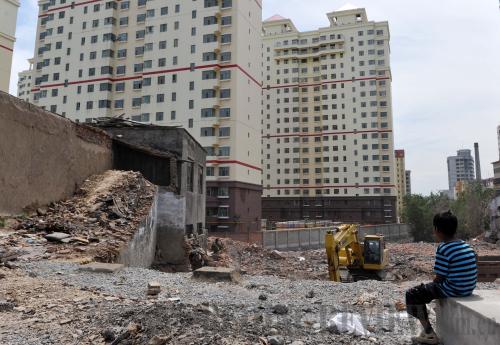|
 |
|
CHANGING LANDSCAPE: A boy sits near a construction site in Urumqi, Xinjiang Uygur Autonomous Region. The forecast that half of China's existing houses would have to be rebuilt in 20 years has stirred concern about possible waste and material use (JIANG WENYAO) |
Monopolies Appeal
The results of the 2010 Best Employers Survey were recently released in Beijing. It shows college graduates' most favored employers are state-owned enterprises, monopoly enterprises in particular, followed by joint-venture enterprises and government-sponsored institutions. Wholly foreign-owned enterprises that used to be very popular rank fifth on the list. College graduates are free to choose working in monopoly enterprises, but if their choices are limited to these enterprises, which are known for stable income, high social status, good welfare benefits and low work pressure, it's not a good thing for overall social progress. The reality is monopoly enterprises have access to privileges and welfare that are unattainable for ordinary people.
To rid college graduates of their obsession with monopoly enterprises, the key is to establish a fair income system. More important is to create conditions for all enterprises to compete in the market on an equal footing. The country's overall development in the long run does not depend on monopoly enterprises.
Yanzhao Evening News
Unreasonable Delays
Recently, frequent flight delays have led to a lot of conflicts between passengers and airline staff. Passengers have even developed the belief that in China flight delays are normal.
Xia Xinhua, Vice Minister of Civil Aviation Administration of China claimed the on-schedule flight rate for Chinese airlines is 80 percent. He said recent flight delays were mainly attributable to extreme air conditions. By way of further explanation, passengers never realized the time on the ticket was the time the plane shuts its door, not the departure time. After the door had been closed, the plane needed a certain time to taxi. This official said it was because passengers did not know about this they felt the time to take off was always later than the time on the ticket.
The majority of China's airlines are state-owned enterprises. Their airplanes are advanced and the salaries their pilots receive are attractive. The right thing for airlines to do is to offer better services and properly handle passengers' complaints, instead of giving irresponsible and ridiculous explanations likely to give rise to greater disputes.
West China Metropolis Daily
Heritage Windfall
Soon after the UNESCO included China's Danxia landform in the World Heritage List, the Management Committee of Danxia Mountain in Guangdong Province claimed the first-class scenic spot must charge admission befitting its status. In other words, the price would be raised.
The current 100-yuan ($14.7) admission price for Danxia Mountain is not low, given Chinese residents' per-capita income, but the committee says admission tickets for other world heritage sites in the country are more than 200 yuan ($29.4).
Past experience shows every time a scenic spot is put on the World Heritage List, the admission price soon rises sharply, as happened at Jiuzhaigou and Huangshan Mountain.
For many local governments, the bid for world heritage status is just the start. What they are more interested in is the ensuing commercial development of the concerned scenic spots rather than preservation. Construction takes money and price hikes naturally happen.
But in many cases the so-called "construction" only damages the natural environment of these scenic spots. In worst-case scenarios, overdevelopment results in devaluation of the cultural and natural heritage sites.
Cultural heritage sites are irreplaceable symbols of a nation's cultural roots. If high admission prices block public entry, and commercial development of the sites is randomly carried out, it goes against the basic principles of preserving world heritage sites.
China Youth Daily
Short-lived Houses
At this year's China Real Estate and Finance Forum in early August, Chen Huai, Director of the Policy Research Office of the Ministry of Housing and Urban-Rural Development, said during the next 20 years, half of China's houses would need to be demolished and rebuilt.
While low-carbon design is becoming fashionable in house building, we have neglected extending houses' duration as the most effective way of conserving energy and cutting carbon emissions.
For various reasons, in China, the average duration of houses is 30 years. In some countries, century-old houses are common. They become naturally integrated into the rest of the whole city.
Extending the duration of houses is not only making them stronger. It's also important to take into consideration the overall urban planning, because sometimes the layout of apartments, communities and public facilities no long matches the pace of urban development. Profit-driven real estate developers are reluctant to pay attention to the quality of buildings and the long-term planning of a city.
China is now at a key point of urbanization. If buildings are repeatedly built and pulled down, how many of today's new buildings are to be turned into rubbish, wasting resources and causing huge carbon emissions?
China Industrial Economy News | 